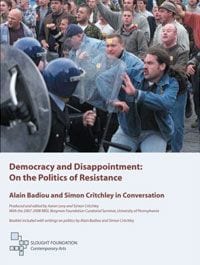
Let’s just get this first bit out of the way: this is not a “movie” in any conventional sense. It is, and should be approached as, a joint lecture by two eminent philosophers given to a room full of undergrads. It was shot on two digital cameras and edited together fairly arbitrarily. It is like a You Tube video that lasts for the better part of two hours, replete with fuzzy visual and unpredictable audio quality, and lacking any real production values.
Indeed, there are times when people walk in front of the camera, when the camera cannot seem to get a good shot of the man speaking, when the microphone crackles and pops and generally fails to pick up the sound, and (most unfortunately) when members of the audience yawn, fan themselves, and/or appear to be thinking about anything other than the subject at hand. Moreover, it suffers from consistently weird lighting, a static and uninteresting set, and the (let’s face it) very basic problem that it consists of an inherently unfilmworthy thing.
Now, moving on from the this-is-a-weird-film-to-watch-on-DVD-for-almost-two-hours issue, an issue which I have to underline is fairly fundamental considering that this is a movie and not a book-on-tape (which it surely should have been), it must be said that the content of the discussion is consistently fascinating. While utterly stultifying to watch, it is profoundly interesting to listen to this “conversation” between Simon Critchley and Alain Badiou, two of the more prominent contemporary philosophers.
Critchley, whose lovely British accent and enviable articulateness, is in direct contrast with the elder Badiou’s obfuscatory accent, opens the discussion with a rather provocative talk on nihilism in the post-9/11 scene. He reminds us that there are in operation two key forms of nihilism – passive and active, as established by Nietzsche – and that the passive form begets a kind of empty resistance to hegemonic power. People give up, relent, despair, conform, or worse, they pretend to resist. Indeed, it is in the active form of nihilism that we have seen various expressions of counterhegemonic resistance, often with spectacular, and lasting, effects.
However, it is also in this active form of nihilism – and he includes in this category Lenin’s Bolshevism, Marinetti’s Futurism, Guy Debord’s Situationism, and Al Qaeda – that violence is made central to the enterprise. In this activity, the world’s meaningless is structural – it must be torn down. As such, violence is either venerated or pursued. Critchley, who famously crossed swords with Slavoj Zizek this past year over the idea of active versus passive resistance, is not here arguing for violence, but rather against passivity. This is confusing, but important. His lecture is an incisive and brief (at 35 minutes) distillation of the key arguments in his recent book Infinitely Demanding (2007).
For his part, Badiou offers a difficult, somewhat rambling discussion of Critchley’s arguments vis-à-vis resistance. However, his thick French accent obscures much of what he has to say to the untrained ear. Still, the key point to be taken from Badiou’s lecture is that Truth needs to re-emerge as a viable philosophical category. His anti-postmodernist approach is predicated on the view that without a re-appreciation of the possibility for truth (as opposed to Meaning, which is subjective), a politics of resistance cannot cohere into anything beyond ineffectual and small-scale affronts. He makes wide reference to the role of the event in all of this, and also to interruptions. Indeed, his lecture is a combination of a response to Critchley and a précis of his 2004 work Infinite Truth.
Ultimately, this is an interesting and informative lecture that, through this DVD, we can all sort of attend. So, for the 20-or-so of you for whom that doesn’t sound like a horrific way to spend a couple hours: enjoy. Everyone else: read their books.

![Call for Papers: All Things Reconsidered [MUSIC] May-August 2024](https://www.popmatters.com/wp-content/uploads/2024/04/all-things-reconsidered-call-music-may-2024-720x380.jpg)



